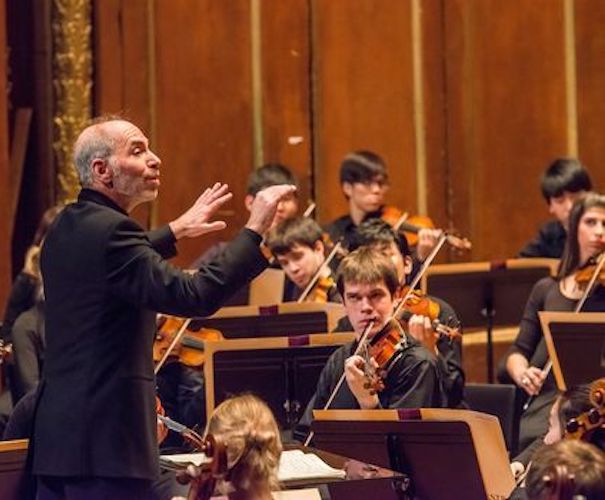Classical Concert Review: New England Conservatory Philharmonia’s “Making Choices”
By Jonathan Blumhofer
May the Boston Symphony — which just concluded its annual weekend celebrating the music of Black composers by shunting them off on their own, away from Rachmaninoff, Strauss, Beethoven, and Friends – take note: this is how it should be done.

David Loebel conducting the NEC Philharmonia. Photo: NEC
It was a truth before the pandemic and remains so today: some of the best orchestral programs of the season are to be had from the student ensembles at New England Conservatory.
This year’s special focus has been on the music of African American composers. While there’s a certain voguish aspect to such an undertaking of late, Wednesday evening’s program at Jordan Hall demonstrated just how bracing it can be to thoughtfully incorporate this underrepresented repertoire into the canon.
The concert, which featured the NEC Philharmonia and conductor David Loebel, paired Ludwig van Beethoven’s Coriolan Overture and Franz Schubert’s Symphony no. 9 with Anthony Davis’s Notes from the Underground.
Written in 1988, Notes draws heavily on jazz — Duke Ellington’s Diminuendo and Crescendo in Blue was an inspiration — as well as various rhythmic schema: ostinatos, rhythmic palindromes, phase patterns, and whatnot all have their roles to play in its two movements.
The first, “Shadow,” is short and fragmentary. Shards of ideas and themes are passed through the orchestra, often accompanied by a drum kit. In the second, “Act,” bold unison figures gradually come apart and transform into a series of different shapes and characters. The music seems to be constantly in flux, dense and busy one moment, quietly Bluesy the next. Throughout, there’s a strong dancing impetus to the proceedings: Davis’s writing never lets up in visceral energy.
On Wednesday, the Philharmonia’s performance captured much of this latter quality. Yes, some attacks felt perhaps a hair precious. But the larger reading was clean, impressively balanced, limber, and vibrant.
Notes’ bristling spirit connected smartly with the night’s other offerings.
Beethoven’s 1807 Coriolan Overture is one of the composer’s tautest, most focused offerings. True, the Philharmonia’s reading of it Wednesday was a bit after the Klemperer fashion — which is to say, broad of tempo and more songful than not. But its inner voices, especially the implacable eighth-note patterns that give the music so much of its ominous edge, came out well.
Like the Davis, Schubert’s Ninth Symphony, which closed the night, wants nothing for personality. Its four movements are packed with ideas (perhaps most conspicuously, a duel between duple and triplet rhythmic patterns) that are put through nearly every conceivable developmental process. That means the Ninth can go on — and feel — like the longest symphony in the book.
Loebel’s reading on Wednesday avoided the worst of its excesses by not observing the outer movement’s exposition repeats. His tempos also moved with winning purpose.
Throughout, the Philharmonia evinced a strong feel for the music’s energetic profile and dynamic shape even if spots (especially in the last two movements) weren’t quite as rhythmically snappy as they might have been.
The performance’s most striking playing came during the second movement, which was taut, well-directed, and built to a blazingly intense climax. Solos (and duets) from principal oboe Kip Zimmerman and principal clarinet Erica Smith were radiant. What’s more, the movement’s textural layers were clearly and distinctly illuminated.
While worlds apart from the Davis in terms of style, sonority, and harmonic language, this was one moment last night in which the near and distant pasts spoke grippingly to the present.
That’s, in part, the power of a good program. May the Boston Symphony — which just concluded its annual weekend celebrating the music of Black composers by shunting them off on their own, away from Rachmaninoff, Strauss, Beethoven, and Friends — take note: this is how it should be done.
Up next: Hugh Wolff leads the NEC Symphony in music by Tan Dun, Prokofiev, William Grant Still, and Tchaikovsky at 7:30 p.m. at Jordan Hall on November 10. Tickets and livestream are free.
Jonathan Blumhofer is a composer and violist who has been active in the greater Boston area since 2004. His music has received numerous awards and been performed by various ensembles, including the American Composers Orchestra, Kiev Philharmonic, Camerata Chicago, Xanthos Ensemble, and Juventas New Music Group. Since receiving his doctorate from Boston University in 2010, Jon has taught at Clark University, Worcester Polytechnic Institute, and online for the University of Phoenix, in addition to writing music criticism for the Worcester Telegram & Gazette.
